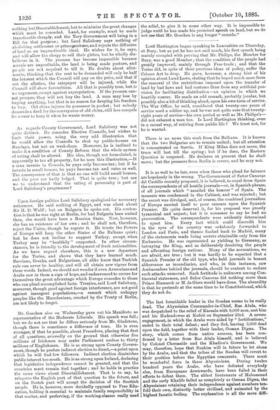Upon foreign politics Lord Salisbury apologised for necessary reticences. He
said nothing of Egypt, and was silent about Sir H. D. Wolff ; but on Bulgaria he spoke out. His conten- tion is that he was right at Berlin, for had Bulgaria been united then, she would have been a Russian State. Now, however, she has an existence of her own ; and he shall not, therefore, reject the Union, though he regrets it. He trusts the Powers of Europe will keep the other States of the Balkans quiet; but he does not incline to support Turkey, except when Turkey may be " healthily " supported. In other circum- stances, he is friendly to the development of fresh nationalities. As we have argued elsewhere, this is a new departure for the Tories, and shows that they have learned much. Servians, Greeks, and Bulgarians, all alike know that Turkish rule can never be healthy, and will all obtain new vigour from these words. Indeed, we should not wonder if even Armenians and Arabs saw in them a sign of hope, and endeavoured to secure for themselves the great advantage which Europe concedes to those who can plead accomplished facts. Treaties, said Lord Salisbury, moreover, though good against foreign interference, are not good against insurgent populations,—a remark which unhappy peoples like the Macedonians, crushed by the Treaty of Berlin, are not likely to forget.


































 Previous page
Previous page